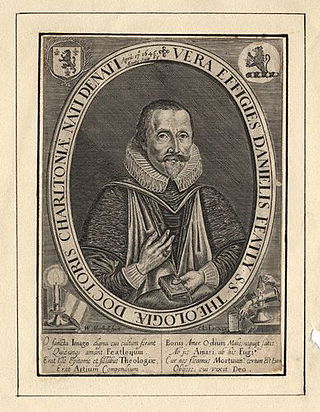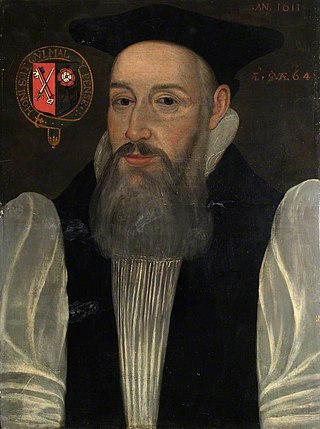Related Research Articles

The King James Version (KJV), also the King James Bible (KJB) and the Authorized Version (AV) is an Early Modern English translation of the Christian Bible for the Church of England, which was commissioned in 1604 and published in 1611, by sponsorship of King James VI and I. The 80 books of the King James Version include 39 books of the Old Testament, 14 books of Apocrypha, and the 27 books of the New Testament.

Lancelot Andrewes was an English bishop and scholar, who held high positions in the Church of England during the reigns of Elizabeth I and James I. During the latter's reign, Andrewes served successively as Bishop of Chichester, of Ely, and of Winchester and oversaw the translation of the King James Version of the Bible. In the Church of England he is commemorated on 25 September with a lesser festival.
William Tyndale was an English biblical scholar and linguist who became a leading figure in the Protestant Reformation in the years leading up to his execution. He is well known as a translator of the Bible into English, and was influenced by the works of prominent Protestant Reformers such as Martin Luther.
William de Corbeil or William of Corbeil was a medieval Archbishop of Canterbury. Very little is known of William's early life or his family, except that he was born at Corbeil, south of Paris, and that he had two brothers. Educated as a theologian, he taught briefly before serving the bishops of Durham and London as a clerk and subsequently becoming an Augustinian canon. William was elected to the See of Canterbury as a compromise candidate in 1123, the first canon to become an English archbishop. He succeeded Ralph d'Escures who had employed him as a chaplain.
Ralph d'Escures was a medieval abbot of Séez, bishop of Rochester, and then archbishop of Canterbury. He studied at the school at the Abbey of Bec. In 1079 he entered the abbey of St Martin at Séez and became abbot there in 1091. He was a friend of both Archbishop Anselm of Canterbury and Bishop Gundulf of Rochester, whose see, or bishopric, he took over on Gundulf's death.

John Rogers was an English clergyman, Bible translator and commentator. He guided the development of the Matthew Bible in vernacular English during the reign of Henry VIII and was the first English Protestant executed as a heretic under Mary I of England, who was determined to restore Roman Catholicism.

The Revised Version (RV) or English Revised Version (ERV) of the Bible is a late-19th-century British revision of the King James Version. It was the first officially authorised and recognised revision of the King James Version in Great Britain. The work was entrusted to over 50 scholars from various denominations in Great Britain. American scholars were invited to co-operate, by correspondence. Its New Testament was published in 1881, its Old Testament in 1885, and its Apocrypha in 1894. The best known of the translation committee members were Brooke Foss Westcott and Fenton John Anthony Hort; their fiercest critics of that period were John William Burgon, George Washington Moon, and George Saintsbury.
Early Modern English Bible translations are those translations of the Bible which were made between about 1500 and 1800, the period of Early Modern English. This was the first major period of Bible translation into the English language including the King James Version and Douai Bibles. The Reformation and Counter-Reformation led to the need for Bibles in the vernacular with competing groups each producing their own versions.

John Rainolds was an English academic and churchman, of Puritan views. He is remembered for his role in the Authorized Version of the Bible, a project of which he was initiator.
Robert of Melun was an English scholastic Christian theologian who taught in France, and later became Bishop of Hereford in England. He studied under Peter Abelard in Paris before teaching there and at Melun, which gave him his surname. His students included John of Salisbury, Roger of Worcester, William of Tyre, and possibly Thomas Becket. Robert was involved in the Council of Reims in 1148, which condemned the teachings of Gilbert de la Porrée. Three of his theological works survive, and show him to have been strictly orthodox.

Daniel Featley, also called Fairclough and sometimes called Richard Fairclough/Featley, was an English theologian and controversialist. He fell into difficulties with Parliament due to his loyalty to Charles I of England in the 1640s, and he was harshly treated and imprisoned at the end of his life.

Samuel Ward (1572–1643) was an English academic and a master at the University of Cambridge. He served as one of the delegates from the Church of England to the Synod of Dort.
John Scory was an English Dominican friar who later became a bishop in the Church of England.
Eadsige, was Archbishop of Canterbury from 1038 to 1050. He crowned Edward the Confessor as king of England in 1043.

John Overall (1559–1619) was the 38th bishop of the see of Norwich from 1618 until his death one year later. He had previously served as Bishop of Coventry and Lichfield, as Dean of St Paul's Cathedral from 1601, as Master of Catharine Hall from 1598, and as Regius Professor of Divinity at Cambridge University from 1596. He also served on the Court of High Commission and as a Translator of the King James Version of the Bible.
Richard Thomson, sometimes spelled Thompson, was a Dutch-born English theologian and translator. He was Fellow of Clare Hall, Cambridge and the translator of Martial's epigrams and among the "First Westminster Company" charged by James I of England with the translation of the first 12 books of the King James Version of the Bible. He was also known for his intemperance and his doctrinal belief in Arminianism.

The Caroline Divines were influential theologians and writers in the Church of England who lived during the reigns of King Charles I and, after the Stuart Restoration, King Charles II. There is no official list of Caroline-era divines; they are defined by the era in which they lived, and Caroline Divines hailed from England, Ireland, Scotland, and Wales. However, of these four nations, it is Caroline England which is most commonly considered to have fostered a golden age of Anglican scholarship and devotional writing, despite the socio-cultural upset of civil war, regicide, and military rule under Oliver Cromwell. Importantly, the term divine is restricted neither to canonised saints nor to Anglican figures, but is used of many writers and thinkers in the wider Christian church.

Thomas Ravis was a Church of England bishop and academic. He was among those engaged in translating the King James Bible.

Thomas Bilson was an Anglican Bishop of Worcester and Bishop of Winchester. With Miles Smith, he oversaw the final edit and printing of the King James Bible.

The reign of King James I of England (1603–1625) saw the continued rise of the Puritan movement in England, that began during reign of Queen Elizabeth (1558–1603), and the continued clash with the authorities of the Church of England. This eventually led to the further alienation of Anglicans and Puritans from one another in the 17th century during the reign of King Charles I (1625–1649), that eventually brought about the English Civil War (1642–1651), the brief rule of the Puritan Lord Protector of England Oliver Cromwell (1653–1658), the English Commonwealth (1649–1660), and as a result the political, religious, and civil liberty that is celebrated today in all English speaking countries.
References
- ↑ "Barlow, William (BRLW580W)". A Cambridge Alumni Database. University of Cambridge.
- ↑ The Extinct and Dormant Baronetcies of England, Ireland, and Scotland, by Messrs., John & John Bernard Burke, 2nd edition, London, 1841, p.594.
- Knighton, C. S., ‘Barlow, William (d. 1613)’, Oxford Dictionary of National Biography, Oxford University Press, Sept 2004; online edn, Jan 2008
- McClure, Alexander. (1858) The Translators Revived: A Biographical Memoir of the Authors of the English Version of the Holy Bible. Mobile, Alabama: R. E. Publications (republished by the Maranatha Bible Society, 1984 ASIN B0006YJPI8 )
- Nicolson, Adam. (2003) God's Secretaries: The Making of the King James Bible. New York: HarperCollins ISBN 0-06-095975-4